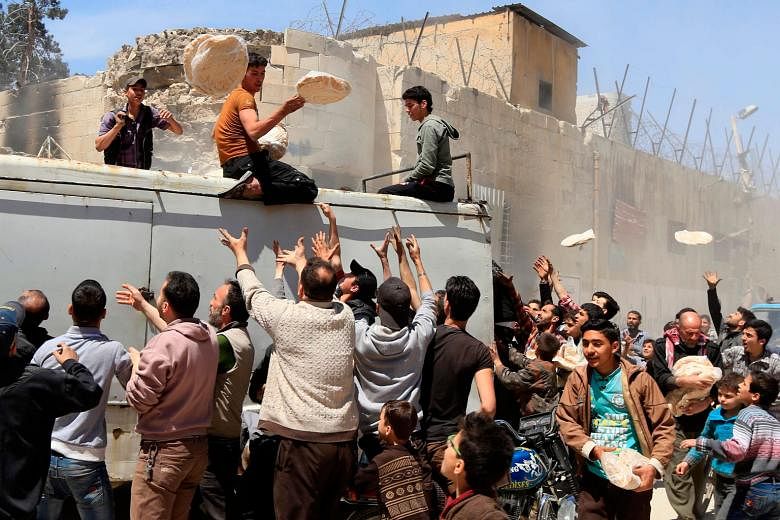DAMASCUS • Experts from the global watchdog, the Organisation for the Prohibition of Chemical Weapons (OPCW), entered the Syrian town of Douma yesterday, state media said.
The international inspectors had arrived in Syria at the weekend to probe a suspected gas attack that sparked a US-led missile strike last Saturday.
"Experts from the chemical weapons committee entered the town of Douma," state news agency Sana said. The mission had appeared to be in question earlier yesterday after Western powers warned that relevant evidence could have been removed from the area or tampered with.
Following weekend missile strikes on Syria by the US, France and Britain, Russia traded accusations with Western nations on Monday, dismissing as "a blatant lie" accusations that Moscow was hindering the investigation in Douma.
The four nations confronted each other in tense emergency talks at the OPCW in The Hague as inspectors prepared for a difficult and dangerous mission.
France said yesterday that it was very likely that evidence was disappearing from the location and it called for international inspectors to be given full and quick access to the site.
The weekend missile strikes were in response to an alleged chlorine and sarin gas attack in Douma on April 7 in which 40 people were said to have been killed.
OPCW director-general Ahmet Uzumcu had earlier said his nine-strong, all-volunteer team had reached Damascus but so far "the team has not yet deployed to Douma" due to security issues.
US Ambassador to the OPCW Kenneth Ward, however, claimed that the Russians had already visited the site and "may have tampered with it with the intent of thwarting the efforts of the OPCW fact-finding mission".
The Kremlin dismissed the claims. "I can guarantee that Russia has not tampered with the site," Foreign Minister Sergei Lavrov told the BBC.
And the Russian Ambassador to the Netherlands, Mr Alexander Shulgin, said it was a "blatant lie" that Moscow was hampering the investigation. Instead, he said it was the US, France and Britain who were "standing in the way" of the investigation by ordering air strikes "in the blink of an eye", before the OPCW team had had a chance to do its work.
The missiles that US, French and British warships fired on suspected chemical facilities last Saturday constituted the biggest Western attack against the regime in the seven-year war to topple Syrian President Bashar al-Assad.
The trio of Western powers warned they would repeat the operation if Damascus used chemical weapons again.
Meanwhile, US President Donald Trump has rejected, for now at least, a fresh round of sanctions set to be imposed against Russia, a course change that underscored the schism between the President and his national security team.
The US Ambassador to the United Nations, Ms Nikki Haley, had announced on Sunday that the administration would place sanctions on Russian companies found to be assisting Syria's chemical weapons programme.
But the White House contradicted her on Monday, saying that Mr Trump had not approved additional measures.
Russia analysts said the whipsaw policy shift once again highlighted an administration struggling to find a coherent and consistent voice in dealing with Russia.
In Britain, Prime Minister Theresa May defended her decision to launch air strikes against Syria, answering criticism over her bypassing of Parliament by saying that lawmakers could now hold her to account.
Mrs May, who has regained confidence after winning support for her tough stance on Syria and Russia, said she was driven by the need to decide quickly on joining the US and France in Saturday's strikes.
Saying she had no doubt the "Syrian regime" was behind an attack which she called a "stain on humanity", Mrs May told lawmakers she had acted in the national interest and refused to say whether she would seek their approval for further action.
AGENCE FRANCE-PRESSE, REUTERS, NYTIMES

